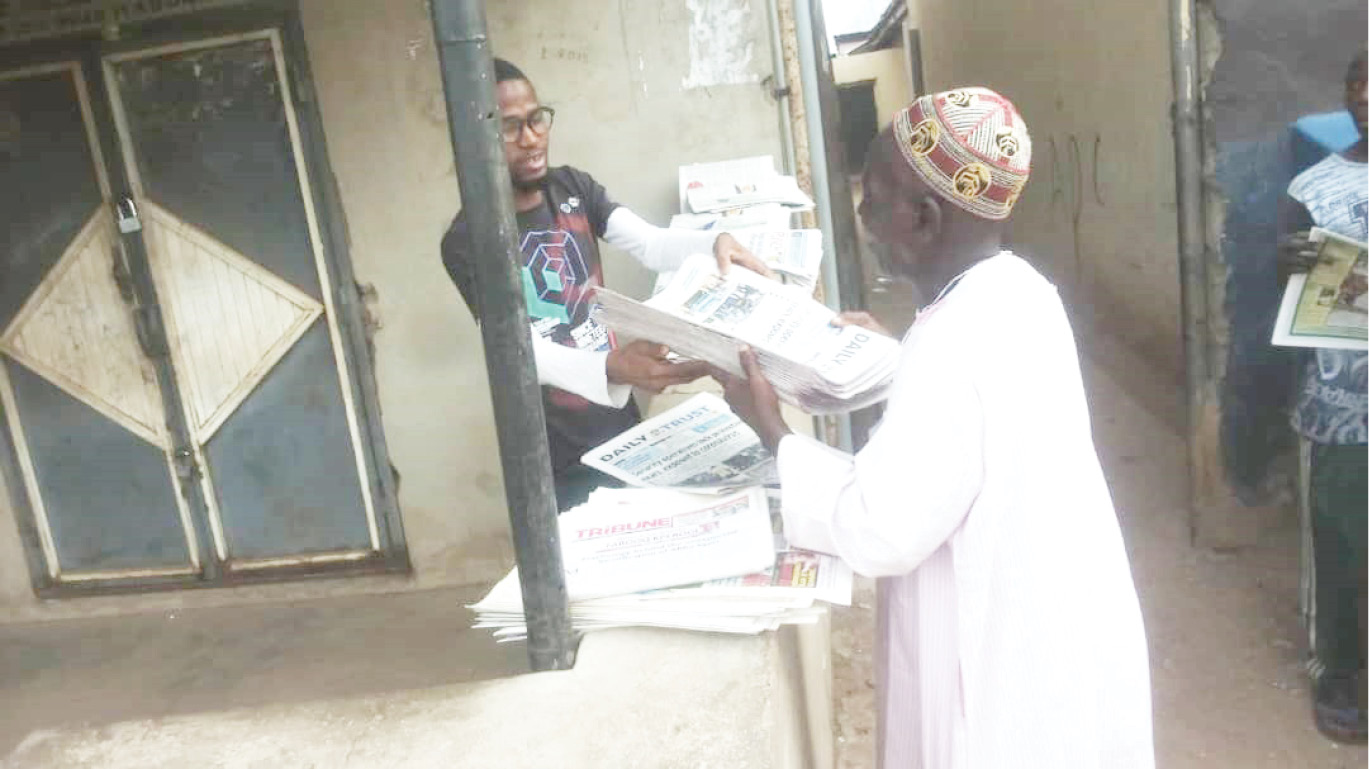From low sales to long-distance walks to make home deliveries, since the advent of coronavirus in Nigeria, newspaper vendors are finding creative ways to remain in business.
Like many businesses, the newspaper trade has been hard hit by the lockdown across the globe due to the novel coronavirus pandemic.
Many national dailies in Nigeria have strengthened their online platforms with the hope of not only keeping existing readers but to attract new readership in a time of low human and social interactions, lack of transport facilities, amidst various uncertainties.
READ: Why Abuja vendors dislike holidays
Since the beginning of the lockdown in most parts of the country, the entire chain of the print media has been hit by dwindling revenue, low supply and sales and other new changes as the industry strives to remain afloat.
One aspect of the newspaper supply chain still struggling in this period is the newspaper vendor who faces an existential challenge.
Two months into a total lockdown in Kaduna State, newspaper vendors say they have found creative ways of getting print editions of newspapers across to their numerous customers as well as convince clients of newspaper safety, all this, while sometimes facing intimidation and harassments at the hands of law enforcement agencies.
Muhammad Abdullahi, a newspaper vendor stationed along the Police College Junction in Kaduna, told Daily Trust that the advent of COVID-19 and the lockdown in Kaduna State has forced on them a new way of life.
READ: COVID-19 curfew: Essential workers groan over police harassment
“With fewer people allowed to leave their homes, newspaper sales have crashed and vendors have to find creative ways of reaching out to clients,” he said.
Abdullahi, who has been in the business for 42 years, says he now walks for many kilometres to follow up on his customers at home and offices just to market the papers and make deliveries.
He said he makes supplies to offices of security and para-military agencies who are on essential duty and need newspapers.
“Sometimes, we are intimidated by security agents because they tell us we are not allowed to come out under the lockdown, but other times, they are civil with us.
“We now have tags which we show them and it has, to a large extent, reduced the hostility,” he said.
Despite the World Health Organisation confirming findings of Virologist George Lomonossoff of the John Innes Independent Research Centre in Norwich that newspapers will not carry or transmit the Covid-19 virus, some Nigerians still have doubts and avoid newspaper vendors even when they (vendors) use face masks and maintain social distance in their interactions with them.
Lomonossoff, an expert in molecular biology, had said, “Newspapers are pretty sterile because of the way they are printed and the process they’ve been through to be produced.
“Traditionally, people have eaten fish and chips out of them for that very reason.
“All of the ink and the print makes them quite sterile.”
The declaration that newspapers will not carry the virus, Abdullahi said had brought them some relief and has left him and other colleagues overjoyed that they can still eke a living if they can convince certain people of the safety of newspapers.
“I walk from my station to Unguwar Rimi to deliver newspapers especially to those who subscribe for copies daily or weekly. I have a customer who is yet to pay me and recently asked me to suspend his subscription for fear that the virus could be transmitted through newspapers,” he said.
Basiru Yakubu, a vendor at Malali, has been in the business for 32 years and says he now walks for about 10 kilometres or more daily to distribute newspapers to his customers.
Malali is a respectable suburb in Kaduna and is home to many senior citizens who Basiru delivers papers to.
Even as some customers decry the reduced number of pages sold at the same price, Basiru said he often tries to explain to customers that the cost of printing remains the same despite the reduced pages.
Encounter with security agents
Narrating an encounter with security agents, Abigail Abel, a newspaper distributor said one of her vendors had been harassed and arrested by security agents who kept him in their custody for hours before he was released.
“They picked him because he was out with his newspapers during the lockdown. Even though he was later released, he was pretty shaken and couldn’t sell his papers the rest of the day,” she said.
Abigail also explained that “There was a day security agents came to Jos Street while newspapers were being distributed and started to flog people; vendors, distributors and everyone there.”
However, that is no longer the case, she said, as the police now see them as partners in progress.
The police confirmed that in the early stages of the lockdown, there had been reports of police intimidating vendors but said all this has become a thing of the past as police officers on patrol have been told to respect vendors as essential service workers.
Supply drop by 50percent
Police Public Relations Officer, Mohammed Jalige urged the vendors to go about their business with decorum and advised that they follow the guidelines on facemasks and social distancing.
Our correspondent reports that newspaper supply in states under lockdown has dropped by almost 50 percent and this has had a drastic effect on sales for distributors and vendors.
“This is because people are forced to remain indoors to stop the spread of the disease. If people are not buying papers, then there is no need for newspaper houses to increase supply, supply has to drop,” said Friday Onoja, a vendor at Television Garage.
Onoja’s customers now have his phone number and often call him to deliver papers to them.
“I walk to Barnawa sometimes to deliver papers and one of my clients told me that while he was on his way to get newspapers, security agents asked him to go back home, that he should instead concentrate on feeding, not newspapers.
“But what they don’t know is that information is as important as food, especially during this period of coronavirus,” he said.

 Join Daily Trust WhatsApp Community For Quick Access To News and Happenings Around You.
Join Daily Trust WhatsApp Community For Quick Access To News and Happenings Around You.


